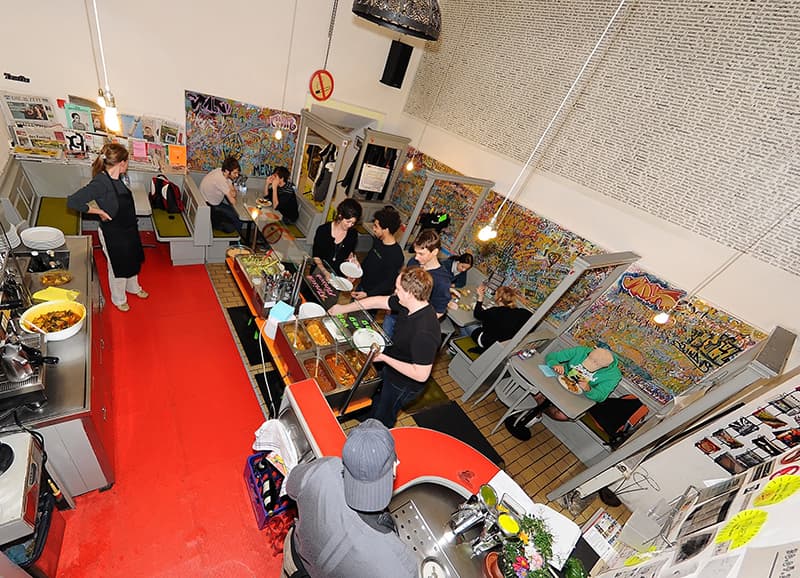As immigrant communities grow in cities around the world, Pakistani, Indian, Chinese, Arabian and other exotic cuisines have found their way into the hearts of a diverse range of people.
In Austria, one set of restaurant owners has introduced yet another dimension to the dining experience — the concept of a 'suggested donation' at an eatery.
'Der Wiener Deewan' in Vienna is a Pakistani restaurant based on a pay-as-you-wish concept: diners pay according to what they thought the food, quality and experience of their meal was worth.
 |
| Der Wiener Deewan from the street. — Sebastian Schoofs |
We contacted Afzaal and Natalie Deewan to find out if you can base a restaurant on good karma.
Dawn.com: As the owners, tell us about yourselves.
Natalie Deewan: Afzaal Deewan, a cricket-player, cook and businessman from Mandi Bahauddin, Pakistan, landed in Vienna, Austria, in 2004 as an asylum seeker. There he met me, Natalie, a student in Languages and Philosophy, and we decided to join forces. Deewan would cook and I handled the rest. One year of intensive research later, we opened the Der Wiener Deewan, which translates to the Viennese divan, with the tagline 'Pakistani Food, Essen für alle' (Food for Everybody). It was the first Pakistani curry buffet-restaurant in town.
Dawn.com: How did the idea for pay-as-you-like come about for the restaurant?
Natalie: We wanted it to be a very accessible place, where the two of us, a student and an asylum seeker, as we were at that time, could have been our own guests. The idea of pay as you wish emerged at the very end: it sounded simple, but radical – and funny! People should be invited to choose their own price, according to their satisfaction, the amount they have eaten and their financial means. Deewan was confident people would like his food, so hopefully, they would pay accordingly. We decided to give it a try and see how far we would get.
Dawn.com: How do you manage to make money or break even when you just trust people to pay as much as they want?
Natalie: We give trust and it comes back! We can trust in people’s capacity to think for themselves: if they did not pay at least a fair price and we therefore had to close, where would they find such a good meal for such a cheap price then? We have lots of regular customers who eat several times a week, some even daily, at our restaurant. They want to come again and in order to find the shop open and food ready, they simply have to pay a fair price. It looks like the majority of our guests want us to keep going.
Dawn.com: Is there a minimum amount to be paid per diner, as is the case with most all-you-can-eat buffets?
Natalie: Before leaving, our guests come to the counter and are invited to choose a price that fits. It should be fair and sometimes our take-away boxes (which have fixed prices, ranging from 5 to 10 Euros) serve as orientation. Since we don’t have fixed prices for the buffet, you are not forced to eat all you can to justify an already set price. You can also eat only a small plate or only dessert and then pay a small amount. We just chose to combine two known concepts, all-you-can-eat and pay-as-you-wish.
 |
| A view of the restaurant's interior. — Sebastian Schoofs |
Dawn.com: What have you learned about people and humanity from your restaurant?
Natalie: A lot.
Dawn.com: Why Pakistani food?
Natalie: Deewan is from Pakistan, his mother and grandmother taught him to cook, hence we serve Pakistani food. Just recently we had Pakistani guests who inquired, whether we also served Chinese food. We said, ‘No, we are a Pakistani curry restaurant.’ ‘Only Pakistani food?’ they asked. ‘Yes, only,’ we answered.
Dawn.com: Is the food specific to any regional style, Sindhi, Punjabi, Balochi, Pashtun?
Natalie: According to Deewan, no. According to many guests, it tastes like home, as they say, ‘Like my mother used to cook!’
Dawn.com: Did it seem that it might not work or that Austrian palates wouldn’t be accepting of Pakistani food?
Natalie: Deewan has adjusted the food to suit Austrian tastes, i.e. less hot, so fewer chilies. If some like it hotter, they can spice it up with different chili sauces.
Dawn.com: How have you constructed the menu for Der Wiener Deewan?
Natalie: We offer a buffet of five different curries: two meat-based, chicken and lamb or beef; three vegetarian/vegan, dhal, vegetables and potato curry. We also serve Basmati rice, bread, salad, sauces and sweets. Drinks, including many local and exotic juices, lassis, beer, wine, lots of different teas and coffee, have fixed prices. Tap water (which in Vienna is of very good quality) is served free of charge.
Dawn.com: What are the customer favorites?
Natalie: Our guests finish off the Lamb Palak very quickly. Vegetarians go after the dhal or the Alu Methi Gajar.
Dawn.com: What’s the ratio of Pakistanis/Indians to Europeans coming into the restaurant on a daily basis?
Natalie: Generally, we host quite a transnational and intercontinental crowd, which includes students from all over Europe, travelers from all over the world, and people of African and Asian origin. Maybe around five percent of our customers are of Pakistani/Indian origin, we guess.
Dawn.com: What flavors most represent Pakistan for you?
Natalie: The cardamom brothers.
Dawn.com: Which Pakistani dish instantly transports you back?
Natalie: Beef nihari.












































